Ecuaciones Diferenciales de Primer Orden 81 12) ( y x 3)dx (x y 3 )dy = O Rpta 4 x y x 4 v4 = c 3 ) iy y eos xy) dx (x x eos xy) dy = 0 Rpta xy sen xy = c 14) (x 1 ) !Say Cos (xy) dy co Solve y ſit n2 dx Question Note 1 y 2 dy=0 Attempt ALL 9 (cosx kany) dax cos(xy) dx (Sim x Say Cos (xy) dy co Solve y ſit n2 dx This question hasn't been solved yet Ask an expert Ask an expert Ask an expert done loading hurry up solve step by stepSolve your math problems using our free math solver with stepbystep solutions Our math solver supports basic math, prealgebra, algebra, trigonometry, calculus and more

Solve X Y 2 Dx X 2y 3 Dy 0 Maths Differential Equations Meritnation Com
X 1 y 2 dx y 1 x 2 dy 000
X 1 y 2 dx y 1 x 2 dy 000-Solution for y (2x^2xy1)dx (xy)dy=0 equation Simplifying y (2x 2 1xy 1) * dx (x 1y) * dy = 0 Reorder the terms y (1 1xy 2x 2) * dx (x 1y) * dy = 0 Reorder the terms for easier multiplication y * dx (1 1xy 2x 2) (x 1y) * dy = 0 Multiply y * dx dxy (1 1xy 2x 2) (x 1y) * dy = 0 (1 * dxy 1xy * dxy 2x 2 * dxy) (x 1y) * dy = 0 (1dxy 1dx 2 y 2 2dx 3 y) (x 1y) * dy = 0 Reorder the terms for easier multiplication 1dxy 1dx 2 y 2Apr 24, 16 · Stack Exchange network consists of 177 Q&A communities including Stack Overflow, the largest, most trusted online community for developers to learn, share their knowledge, and build their careers Visit Stack Exchange
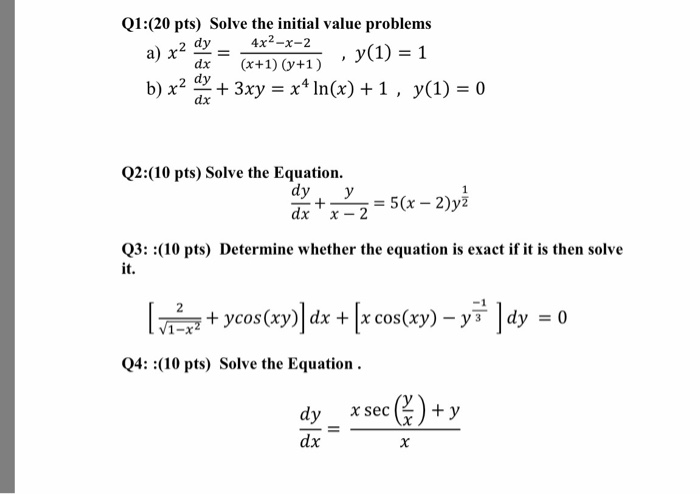


Solved Solve The Initial Value Problems X 2 Dy Dx 4x 2 Chegg Com
Equations Tiger Algebra gives you not only the answers, but also the complete step by step method for solving your equations (2x^2y)dx(x^2yx)dy=0 so that you understand betterThe general solution of y^2dx (x^2 – xy y^2)dy = 0 is (A) tan^1(x/y) logy c = 0 asked Jan 3, in Differential equations by Sarita01 ( 535k points) differential equationsSet the factor 'dy' equal to zero and attempt to solve Simplifying dy = 0 Solving dy = 0 Move all terms containing d to the left, all other terms to the right Simplifying dy = 0 The solution to this equation could not be determined This subproblem is being ignored because a solution could not be determined Subproblem 2
You can separate it out as \frac {ydy}{xdx} =\frac{y^21}{x^21} now put y^21=u and then continue to get a very simple integrable function You can separate it out as x d x y d y = x 2 − 1 y 2 1 now put y 2 1 = u and then continue to get a very simple integrable functionMay 29, 18 · Ex 96, 11 For each of the differential equation find the general solution 𝑦 𝑑𝑥 𝑥− 𝑦2𝑑𝑦=0 Step 1 Put in form 𝑑𝑦𝑑𝑥 Py = Q or 𝑑𝑥𝑑𝑦 P1 x = Q1, y dx (x − y2) dy = 0 y dx = − (x − y2)dy 𝑑𝑦𝑑𝑥 = −𝑦𝑥− 𝑦2 This is not of the form 𝑑𝑦𝑑𝑥 Py = Q ∴ we findClick here👆to get an answer to your question ️ The general solution of the differential equation (1 y^2)dx (1 x^2)dy = 0 is
Weekly Subscription $199 USD per week until cancelled Monthly Subscription $699 USD per month until cancelled Annual Subscription $2999 USD per year until cancelledLearn how to solve differential equations problems step by step online Solve the differential equation xy*dx(1x^2)dy=0 Grouping the terms of the differential equation Group the terms of the differential equation Move the terms of the y variable to the left side, and the terms of the x variable to the right side Simplify the expression \frac{1}{y}dy Integrate both sides of theAug 21, 16 · y = 4e^ (x^3/3) 1 dy/dx=x^2(1y) This is separable 1/(1y) dy/dx=x^2 int \ 1/(1y) dy/dx \ dx = int \ x^2 \ dx int \ 1/(1y) \ dy = int \ x^2 \ dx ln (1y) = x^3/3



How To Solve Math 1 X 2 Dy 1 Y 2 Dx Math Quora



Solve The Following Differential Equation X Sqrt 1 Y 2 Dx Y Sqr
Find dy/dx y=(x^2)/(3x1) Differentiate both sides of the equation The derivative of with respect to is Differentiate the right side of the equation Tap for more steps Differentiate using the Quotient Rule which states that is where and Differentiate Tap for more stepsJun 23, · Find the general solution of differential equation y(1x^2 )^(1/2) dyx√(1y^2 ) dx=0Simple and best practice solution for (xy1)dxx(x4y2)dy=0 equation Check how easy it is, and learn it for the future Our solution is simple, and easy to understand, so don`t hesitate to use it as a solution of your homework If it's not what You are looking for type in the equation solver your own equation and let us solve it



First Order Differential Equations Chapter 2 Ch2 2 Contents 2 1 Solution Curves Without A Solution 2 1 Solution Curves Without A Solution 2 2 Separable Ppt Download



Misc 6 Find General Solution Dy Dx Root 1 Y2 1 X2 0
We have, \\left( 1 x \right)\left( 1 y^2 \right) dx \left( 1 y \right)\left( 1 x^2 \right)dy = 0\ \ \Rightarrow \left( 1 x \right)\left( 1 y^2 \rightJan 22, · Solution Solve the differential equation x (y1) dx (x1)dy=0 If y=2 when x=1Is x=2 a solution of the differential equation?
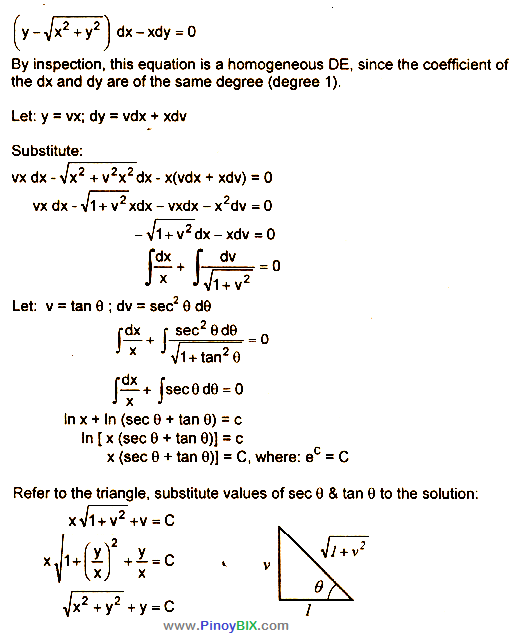


Solution Solve Y X 2 Y 2 Dx Xdy 0



Solve In Series The Equation 1 X 2 D 2y Dx 2 X Dy Dx Y 0 About The Point X 0 Mathematics 2 Question Answer Collection
The equation is M(x,y)dx N(x,y)dy =0 with M = 13xsiny , M_y = 3xcosy N = (x^2)cosy , N_x = 2xcosy # M_y The equation is not exact but, (M_y N_x)/N = 5/x depends only on x The integrating factor e^Integral of (5/x)dx =e^(lnx^5) =1/x^5 leads to the equation P(x,y)dx Q(x,y)dy =0 , with P = 1/x^5 (3siny)/x^4 , P_y = (3cosy)/x^4$$2 xy \ dx x^2 \ dy 1 \ dy = 0 $$ Change the sides $$2 xy \ dx x^2 \ dy = 1 \ See full answer below Become a member and unlock all Study Answers Try it riskfree for 30 daysShow transcribed image text Expert Answer Answer The given equation is (x y 1) dx (y x 5) dy = 0, or, dy/dx = x y 1/x y 5 Put X = x h and Y = y k, then view the full answer Transcribed Image Text from this Question



Sqrt 1 X 2 Dy Sqrt 1 Y 2
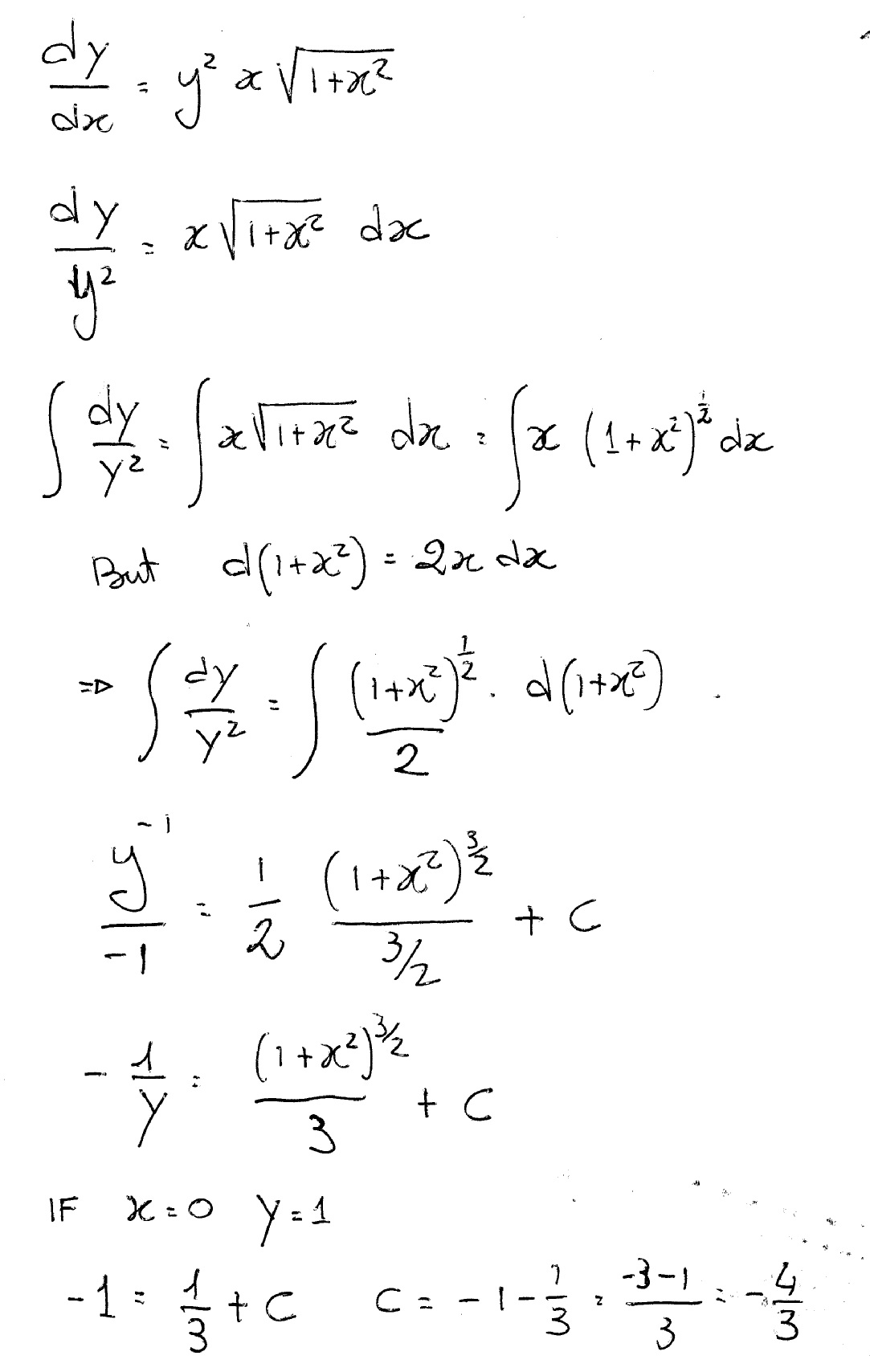


How Do You Solve Dy Dx Y 2xsqrt 1 X 2 Where Y 1 When X 0 Socratic
Feb 03, 16 · But if I expand the bracket $(xy)^2$ before integrating I will get $$\varnothing_1=\int Mdx=\int (xy)^2dx=\int (x^22xyy^2)dx=\frac{x^3}{3}xy^2x^2y$$ Wich will lead to the solution $$\varnothing=\varnothing_1\varnothing_2=\frac{x^3}{3}xy^2x^2yy=Constant$$ What is the wrong step ?Oct 14, 18 · The general solution of y^2dx (x^2 – xy y^2)dy = 0 is (A) tan^1(x/y) logy c = 0 asked Jan 3, in Differential equations by Sarita01 ( 535k points) differential equationsNov 17, 18 · Solve the following differential equation (1 y^2)tan^(1) x dx 2y(1 x^2)dy = 0 asked May 12 in Differential Equations by Yajna (298k points) differential equations;



Solve Y 1 Xy Dx X 1 Xy X 2y 2 Dy 0 Mathematics Stack Exchange



X 1 Y 2 Dx Y 1 X 2 Dy 0 Youtube
2xydx(y23x2)dy=0 Geometric figure Two Straight Lines Slope = 1 xintercept = 0/1 = yintercept = 0/1 = Slope = 00/00 = 1000 xintercept = 0/1Rewrite in the form of yy'= — x^2 / (x1) ;Solve x dy y dx = x 2 y 2 dx Medium View solution For each the differential equations given, find the general solution d x d y



Solve 1 X 2 D 2y Dx 2 X Dy Dx Y X 1 X 2 3 2 Mathematics 2 Question Answer Collection



Solve The Differential Equation X 1 Y 2 Dx Y 1 X 2 Dy
Jul 10, 16 · Help a stranger please This is for my homework and I'm having a hard time solving these equations Show the complete solutions and final answers please It will be a great help Thank you so much This covers Additional Topics on Equations of Order One, Coefficient Linear in Two Variables 1 (6x3y2)dx(2xy1)dy=0 2 (x2y1)dx(2xy5)dy=0Note that mathy'=\dfrac{x^2y^21}{x(2yx)}/math The substitution mathu=(2yx)^2/math transforms this to a linear DE math\begin{align*}u' &= 2(2yx)(2y'1Solve the differential equation x(1y2)dx−y(1 x2)dy =0


How To Get The Special Solution Of This Differential Equation Y Xdy Dx 2 1 X 2 Dy Dx Where X 1 Y 1 Quora
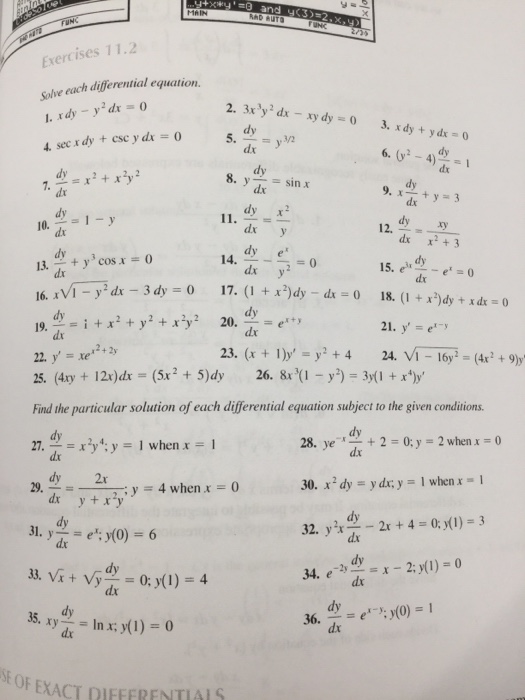


Solved Solve Each Differential Equation Xdy Y 2 Dx 0 Chegg Com
The equation y^2dx (xy x^3 )dy =0 can be rewritten as a Bernoulli type equation in the unknown function x(y) dx/dy x/y = x^3/y^2 The position x = V(y)^(1/2) leads to the equation V' (2/y)V = 1/y^2 The integrating factor is 1/y^2Then t(c) ( y 2 x y 1 ) dx ( x 2 x y 1 ) dy = 0With M = y 2 x y 1 and N = x 2 x y 1, note that ( N x M y) / ( x M y N ) = ( x y ) / ( x ( y 2 x y 1 ) y ( x 2 x y 1 ) ) = ( x y ) / ( x y) = 1 Thus, μ = exp ( ∫ d(xy) ) = e xy is an integrating factor The transformed equation is ( y 2 x y 1 ) e xy dx ( x 2 x y 1 ) e xy dy = 0Divide both sides by x(1 — y) to put all factors with x on the left and all factors with y on the right (1 — x^2)/x dx = y(1 y)/ (1 — y) dy Now integrate both sides You'll need to use polynomial division to rewrite both sides as a polynomial plus a proper rational expression first



Engineering Mathematics Notes



Solution 1 Xsqrt X 2 Y 2 Dx Y 1 Sqrt X 2 Y 2 Dy 0 Is X Y 2 2
Solve your math problems using our free math solver with stepbystep solutions Our math solver supports basic math, prealgebra, algebra, trigonometry, calculus and moreJan 01, · selected Jan 2, by Nakul01 Best answer The given differential equation is (1 xy)ydx x (1 – xy)dy = 0 ydx xdy xy (ydx – xdy) = 0 d (xy) xy (ydx – xdy) = 0 (d (xy)/ (xy)) (ydx – xdy) = 0 d (xy)/ (xy) = (xdy – ydx) d (xy)/ (xy)2 = (xdy – ydx)/xy = (dy/y) – (dx/x)Simple and best practice solution for 2xy(4y^2)dx(y1)(x^22)dy=0 equation Check how easy it is, and learn it for the future Our solution is simple, and easy to understand, so don`t hesitate to use it as a solution of your homework



Solve The Following Homogenous Differential Equation X2y 2xy2 Dx X3 3x2y Dy 0 Brainly In



Differential Equations
Explicit substitution of y=x into the given DEqn shows it is a soln Notice (x^23xyy^2)dxx^2dy = x^2dxx^2(dx)=0 Thus it is a solutionMultiply by 2 both sides of equation0 votes 1 answer Solve the following differential equation cos^2 x dy/dx y = tan x asked Mar 13 in Differential Equations by Yaad (352k points)


Solved 3x 8 Y 2 4 Dx 4y X 2 5x 6 Course Hero



Unit 03 Differential Equations Doc Logical Truth Equations
Dec 06, 17 · y arctan(y) = x C We have dy/dx = 11/y^2 Which is a First Order Separable Ordinary Differential Equation so we can rearrange and "separate the variables" dy/dx = (1y^2)/y^2 => int \ y^2/(1y^2) \ dy = int \ dx We can manipulate the LHS integral \ \ \ \ \ int \ (1y^21)/(1y^2) \ dy = int \ dx int \ 1 1/(1y^2) \ dy = int \ dx Which is now trivial to integrate giving us yFind dy/dx y^2=(x1)/(x1) Differentiate both sides of the equation Differentiate the left side of the equation Tap for more steps Differentiate using the chain rule, which states that is where and Tap for more steps To apply the Chain Rule, set asX`sqrt(1y^2)dxysqrt(1x^2)dy=0` solve using variable separable 1 Educator answer Math Latest answer posted January 27, 12 at AM



Homogeneous Differential Equation Y 2 Yx Dx X 2dy 0 Youtube



The Solution Of 1 X 2 Dy Dx 2xy Xsqrt 1 X 2 0 Is A Y 1 X 2
Click here👆to get an answer to your question ️ Solve (x y 1)dx (2x 2y 3)dy = 0 Join / Login > 12th > Maths > Differential Equations > Solving Linear Differential Equation 2 x 2 d x d y − 2 x y y 2 = 0 Hard View solution The general solution of (1 tan y) (d xFind dy/dx y^2=1/(1x^2) Differentiate both sides of the equation Differentiate the left side of the equation Tap for more steps Differentiate using the chain rule, which states that is where and Tap for more steps To apply the Chain Rule, set asHomogeneous Differential Equation (y^2 yx)dx x^2dy = 0If you enjoyed this video please consider liking, sharing, and subscribingYou can also help suppor



For The Differential Equation X 2 Y 2 Dx 2xy Dy 0 Which Of The Following Are True Youtube



Ex 9 5 4 Show Homogeneous X2 Y2 Dx 2xy Dy 0 Ex 9 5
=> x^2dx = y (x1) dy;=> (x^2 )/ (x1) dx = y dy;=> Substitute dy/dx withy' It is a first order separable Ordinary diffEquation of the form of N (y)* y'=M (x) ;Solution for (x^2)dxy (x1)dy=0 equation Simplifying (x 2) * dx y (x 1) * dy = 0 Multiply x 2 * dx dx 3 y (x 1) * dy = 0 Reorder the terms dx 3 y (1 x) * dy = 0 Reorder the terms for easier multiplication dx 3 y * dy (1 x) = 0 Multiply y * dy dx 3 dy 2 (1 x) = 0 dx 3 (1 * dy 2 x * dy 2) = 0 Reorder the terms dx 3 (dxy 2 1dy 2) = 0 dx 3 (dxy 2 1dy 2) = 0 Reorder the terms dxy 2 dx 3 1dy 2 = 0 Solving dxy 2 dxHelp is appreciated Edit



Solve The Linear Differential Equation X 2 1 Dy Dx Xy X Youtube
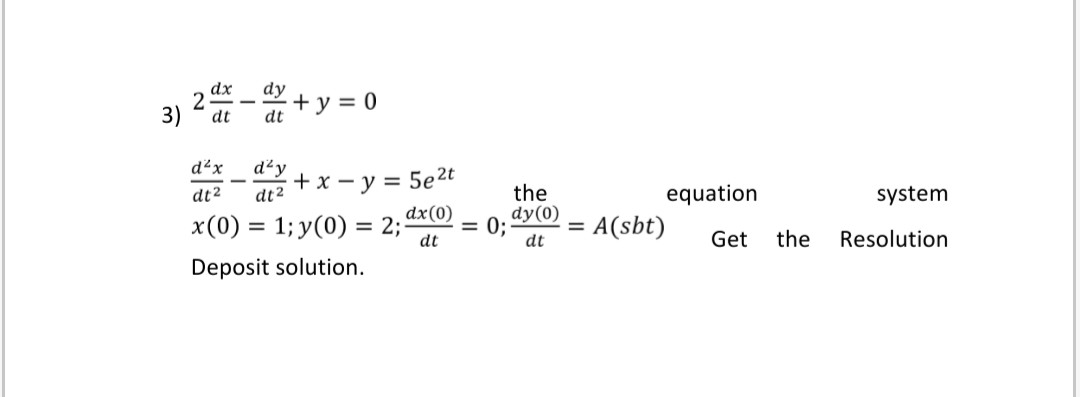


Answered 2 Dx Y 0 Dt D X D Y X Y Bartleby
Given x^2dxy (x1) dy=0;



Worked Example Identifying Separable Equations Video Khan Academy
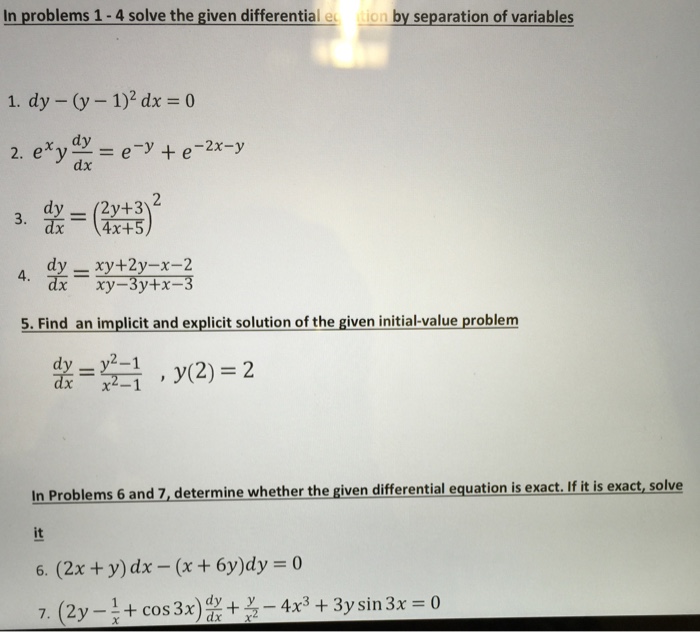


Solved Solve The Given Differentia By Separation Of Varia Chegg Com



Differential Equations Solved Examples 17
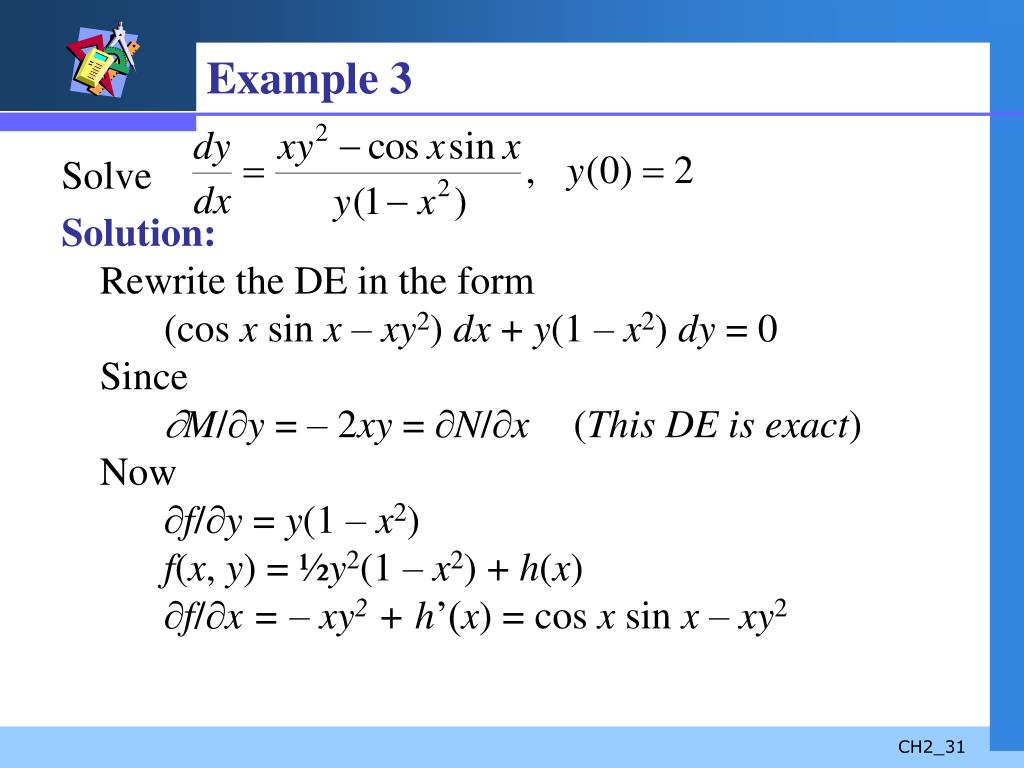


Ppt First Order Differential Equations Powerpoint Presentation Free Download Id
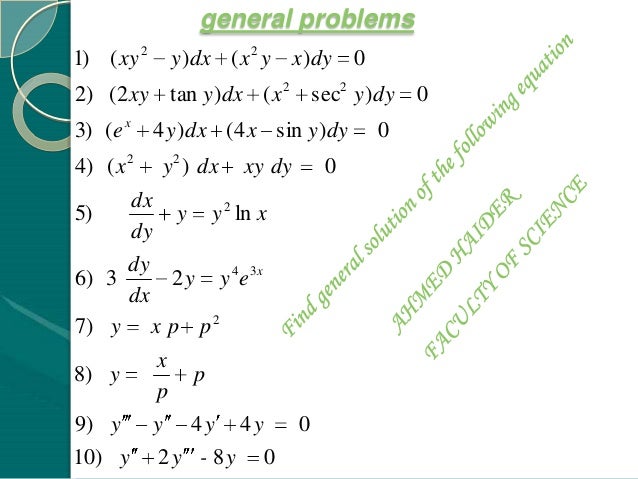


Ordinary Differential Equations



If X 1 Y Y 1 X 0 Then Prove That 1 X 2 Dydx 1 0
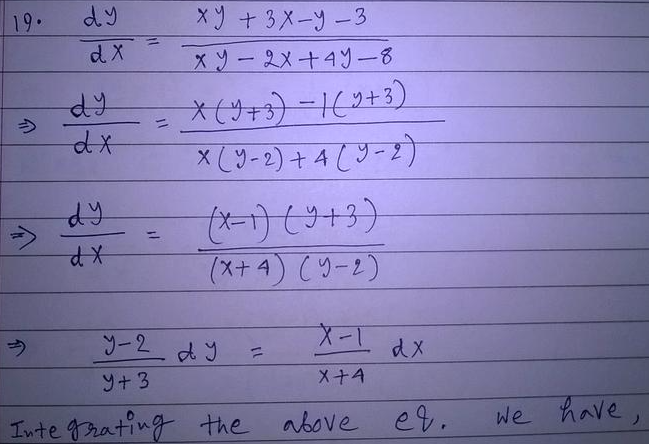


Solve The Given Differential Equation By Separation Of Variables Frac D Y D X Frac X Y 3 X Y 3 X Y 2 X 4 Y 8 Homework Help And Answers Slader


How To Solve The Differential Equation Math X Sqrt 1 Y 2 Dx Y Sqrt 1 X 2 Dy 0 Math Quora



Need Help On 8 9 And 10 Please 1 Point Use Substitution To Find The General Solution Homeworklib


Solved Find The Particular Solution Indicated For The Following Course Hero



Initial Value Problem Dy Dx Y 1 X 3 With Y 1 0 Separable Differential Equation Youtube


Find The General Solution Of Y2dx X2 Xy Y2 Dy 0 Studyrankersonline



Solved Solve The Initial Value Problems X 2 Dy Dx 4x 2 Chegg Com



Engineering Mathematics Notes



Homogeneous Differential Equation Y 2 Yx Dx X 2dy 0 Topic Play



4 Solve The Exact Differential Equation 1 2xy Dx 4y3 X2 Dy 0 4 Solve The Exact Differential Equation Homeworklib



Solve X X 1 Dy Dx Y X2 X 1 2 Maths Differential Equations Meritnation Com
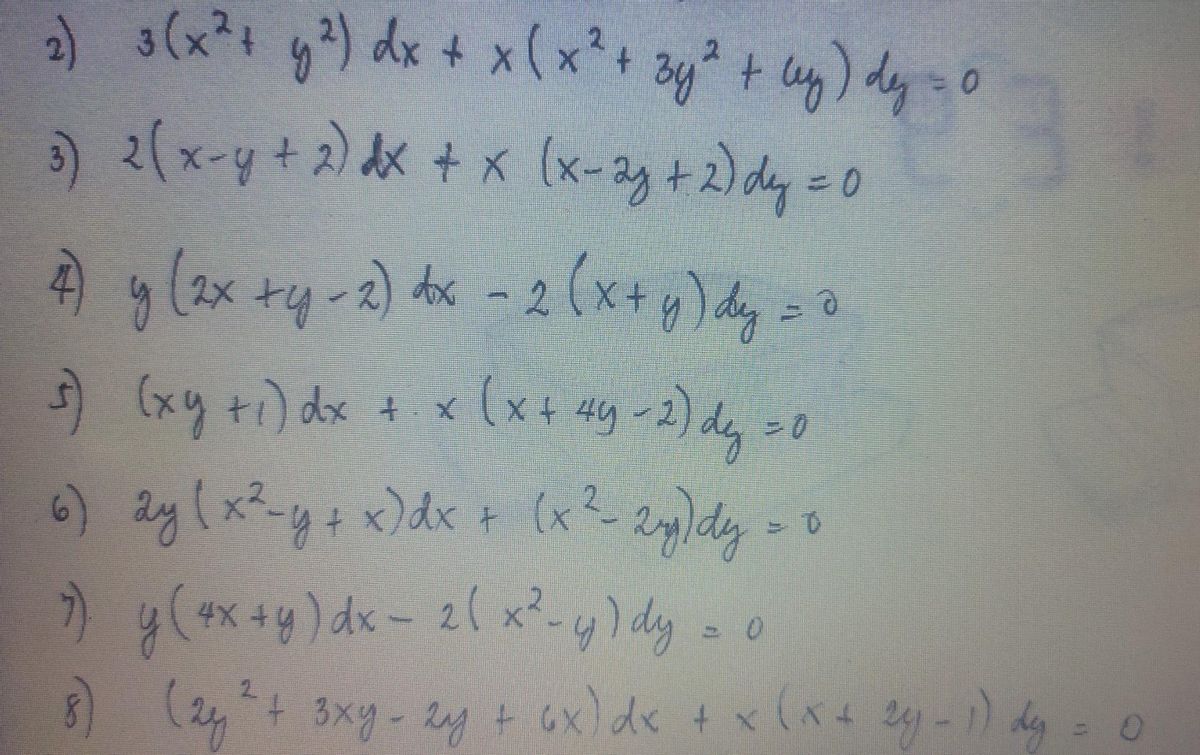


Answered 3 X Y Dx X X Zy Uy Dy O T Bartleby



Solution Solve The Differential Equation X Y 1 Dx X 1 Dy 0 If Y 2 When X 1
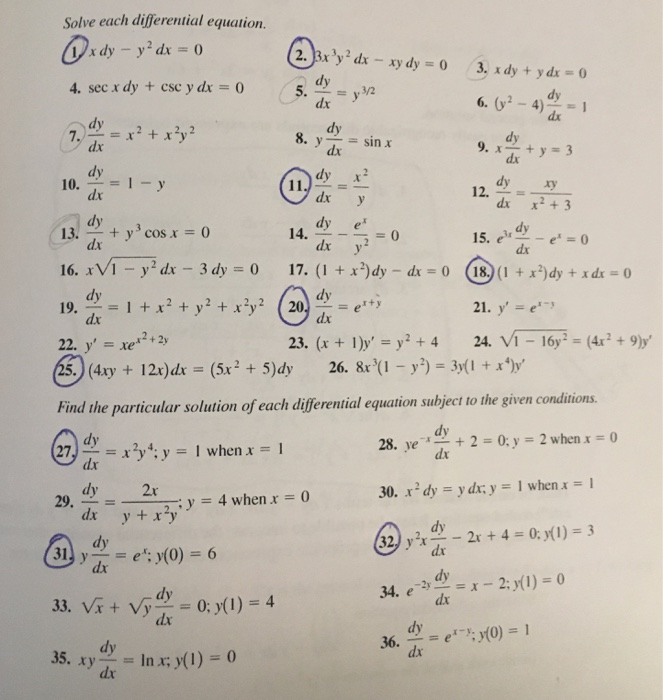


Solved Solve Each Differential Equation 4 Sec X Dy Cs Chegg Com
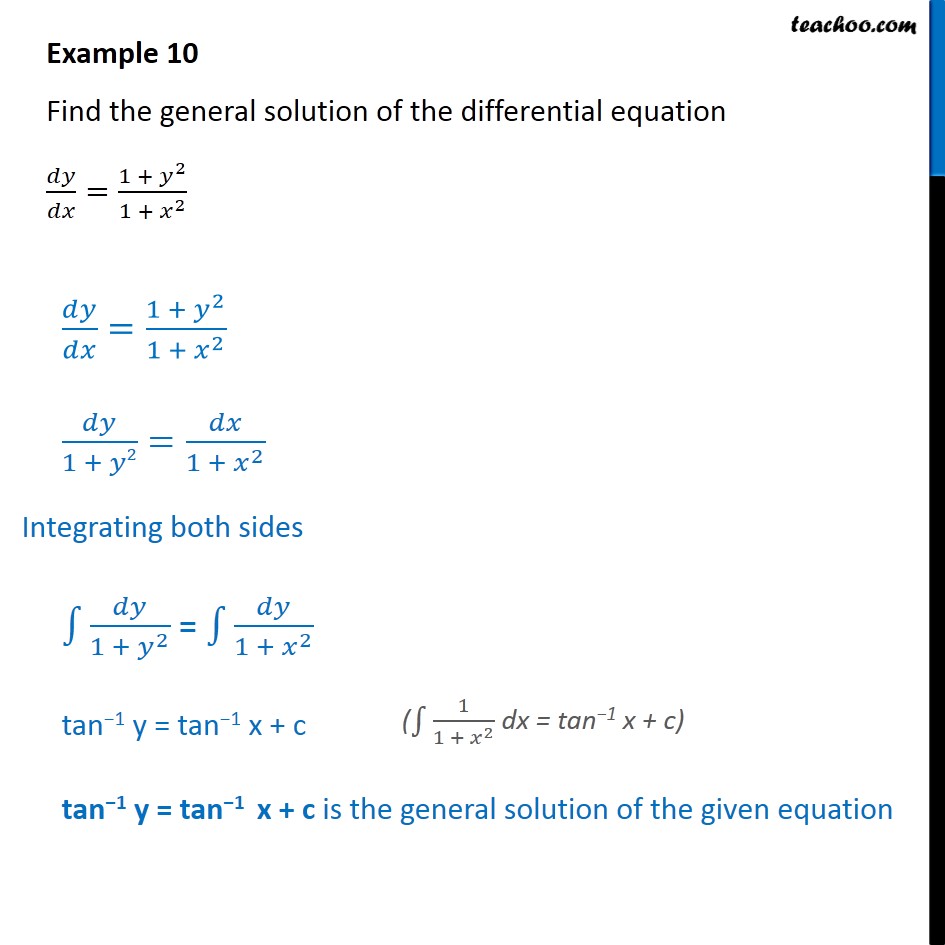


Example 10 Find General Solution Dy Dx 1 Y2 1 X2 Examples



Solve Y 2 2x 2y Dx 2x 3 Xy Dy 0 Mathematics Stack Exchange
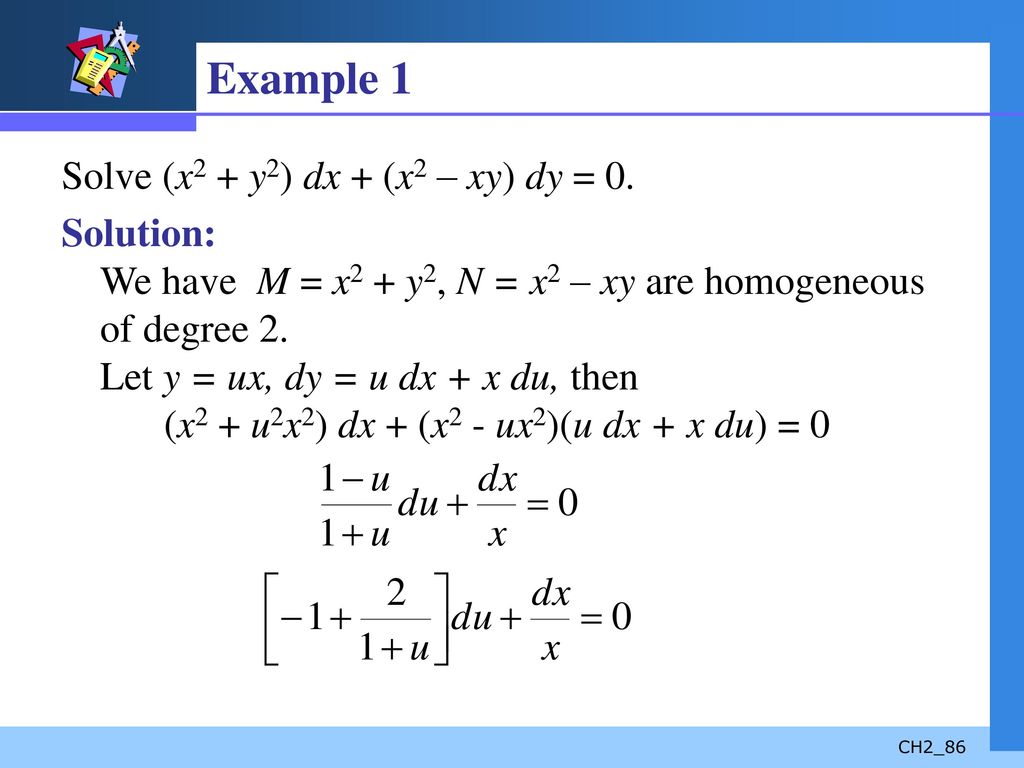


First Order Differential Equations Ppt Download



Slides Show



Ex 9 6 14 Find Particular Solution 1 X2 Dy Dx 2xy


Solve The Differential Equation 1 Y2 Tan 1 X Dx 2y 1 X2 Dy 0 Studyrankersonline
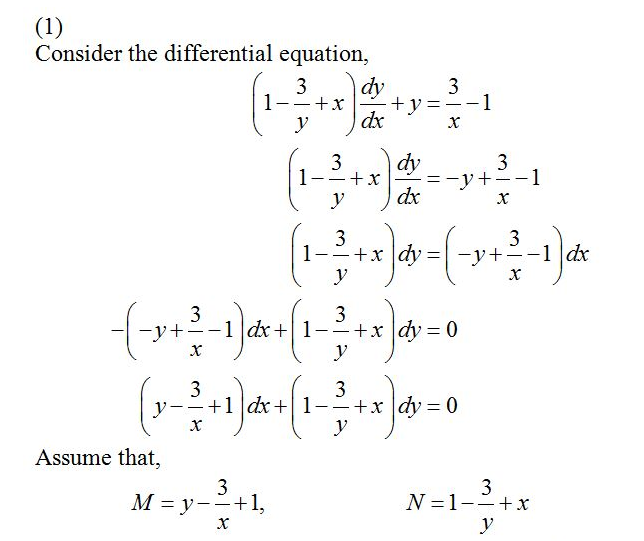


Solve The Following Differential Equation 1 1 3 Y X Dy Dx Y 3 X 1 2 Ln X Y X Dx Ln X Dy 3 X 2 Y 2 Y 4sin X Dx 2xy 4y 3cos X Dy 4 Tan X 8sin X Sin Y Dx 8cos X Cos Y Dy 0 5 1 Y 2sin 2x Dx Ycos 2x Dy 0 Wegglab



Ex 9 6 8 Find General Solution 1 X2 Dy 2xy Dx Ex 9 6



Solved Exercises 2 2 In Problems 1 22 Solve The Given Dif Chegg Com



Math 432 Hw 2 5 Solutions Pdf Free Download



X 1 Y2 Dx Y 1 X2 Dy 0 Brainly In
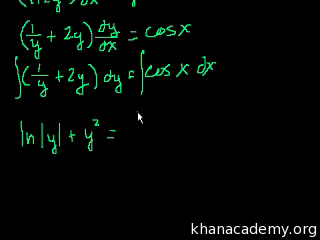


Separable Equations Example Old Video Khan Academy


Solve The Differential Equation Xy 2 X Dx X 2y Y Dy 0 Sarthaks Econnect Largest Online Education Community



Solution Solve The Differential Equation X Y 1 Dx X 1 Dy 0 If
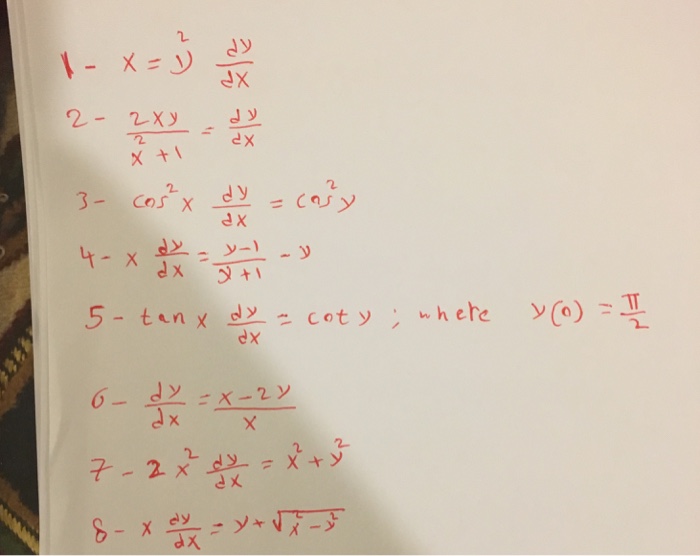


Solved X Y 2 Dy Dx 2xy X 2 1 Dy Dx Cos 2x Dy Dx C Chegg Com



Solve Y 2 2x 2y Dx 2x 3 Xy Dy 0 Mathematics Stack Exchange



Consider The Differential Equation Y 2 Dx X 1 Y Dy 0 If Y 1 1 Then X Is Given By Youtube



Solve This 1 Dydx Y Y X X Y X 2 3xy Y2 Dx X2 Xy Dy 0 Maths Differential Equations Meritnation Com



How To Solve Show The Differential Equations Are Exact 2xy Y Tany Dx X 2 X Tany 2 Secy 2 2 Dy 0 Te Tx 2x Dx Dt Xe Xt 0 Quora



Solve X Y 2 Dx X 2y 3 Dy 0 Maths Differential Equations Meritnation Com
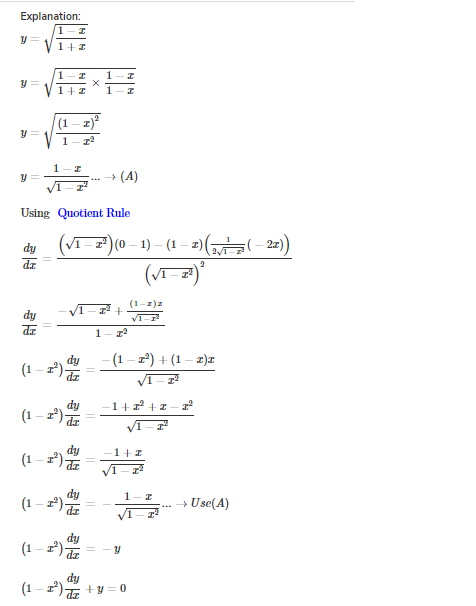


If Y Sqrt 1 X 1 X Prove That 1 X 2 D Y Dx Y 0 Askiitians
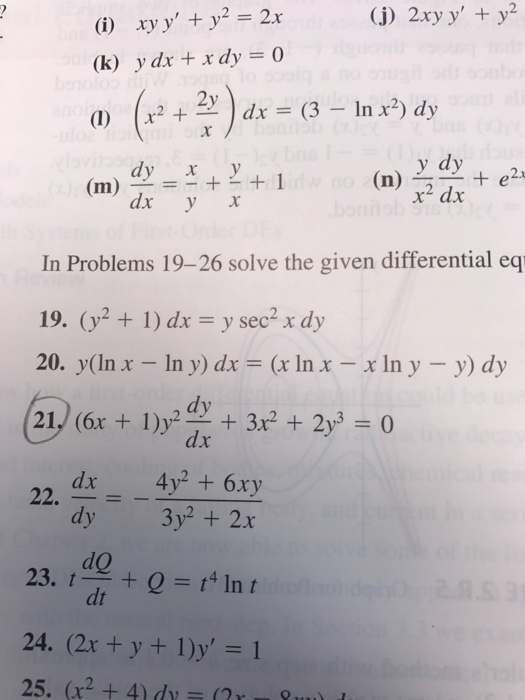


Solved Xy Y Y 2 2x 2xy Y Y 2 Y Dx X Dy 0 X 2 Chegg Com
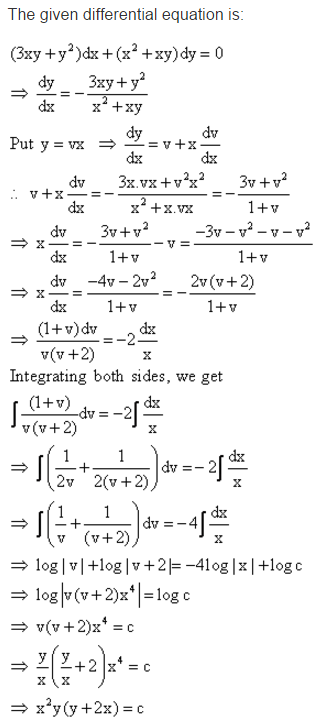


Find The Particular Solution Of Given Differential Equation 3xy Y 2 Dx X 2 Xy Dy 0 At X 1 Y 1 Mathematics Topperlearning Com D1ksg633



8 Differential Equations


Consider The Differential Equation Y 2dx X 1 Y Dy 0 If Y 1 1 Then X Is Given By Sarthaks Econnect Largest Online Education Community
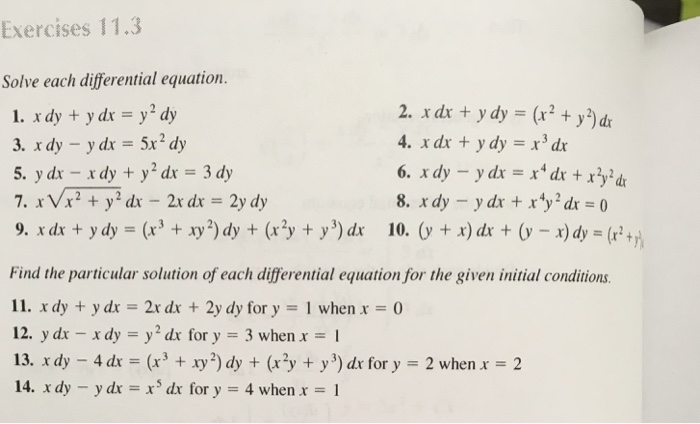


Solved Solve Each Differential Equation 1 X Dy Y Dx Chegg Com



Solve X 2 D 2y Dx 2 X Dy Dx Y 0 Given That Y X 1 X Is A Solution Of It Youtube



Differential Equations Solved Examples Show That Following Differential Equation Is Not Exact 3x 2y 4 2xy Dx 2x 3y 3 X 2 Dy 0 Then Find An Integrating Factor To Solve The Differential Equation



Solve 3xy 2ay 2 Dx X 2 2axy Dy 0 Mathematics Stack Exchange



Solve 1 X 2 D 2y Dx 2 X Dy Dx Y X 1 X 2 3 2 Mathematics 2 Question Answer Collection



Worked Example Separable Equations Differential Equations Video Khan Academy


Solve The Differential Equation 1 Y 2 Tan 1x Dx 2y 1 X 2 Dy 0 Sarthaks Econnect Largest Online Education Community



Solve The Following Differential Equation X Sqrt 1 Y 2 Dx Y Sqrt 1 X 2 Dy 0 Youtube



Differential Equations Solved Examples Solve The Ivp 2xy X 4 Dx X 2 Y 2 Dy 0 Y 0 1


Find The General Solution Of The Differential Equation 1 Y2 X Etan 1y Dy Dx 0 Studyrankersonline



X Y 1 Dx Y X 1 Dy 0find The General Solution Of The Differential Equation Brainly In


What Is The Solution Of The Differential Equation 1 X 2 Dy 1 Y 2 Dx 0 Quora
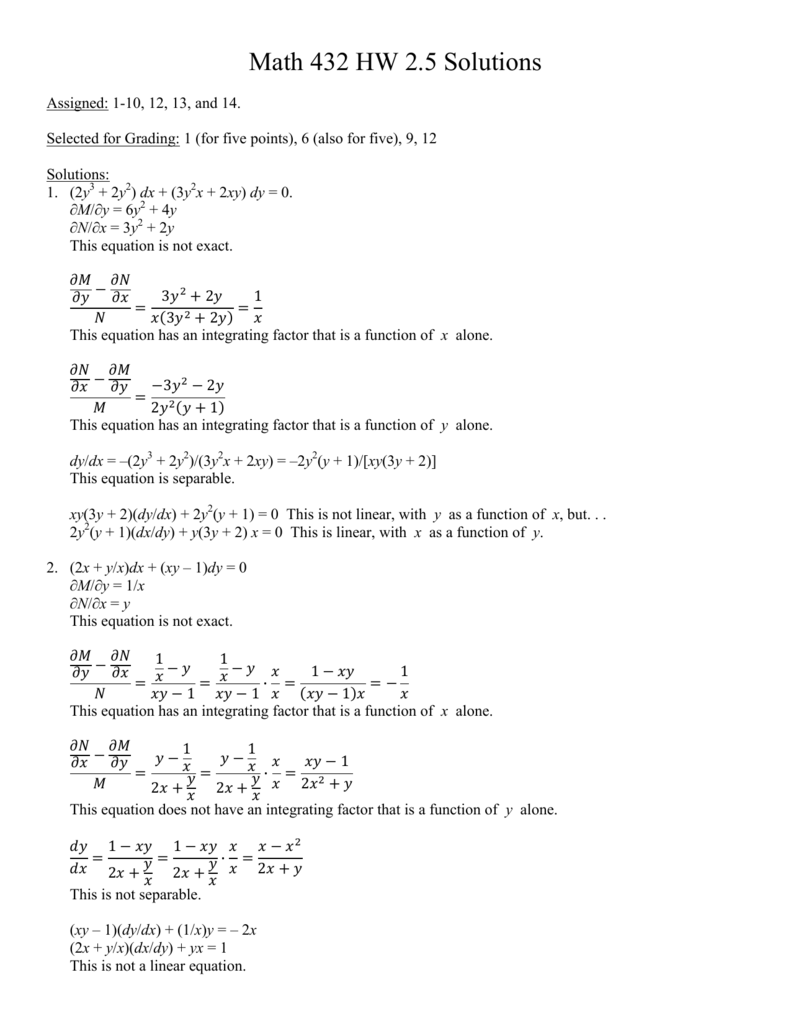


Math 432 Hw 2 5 Solutions
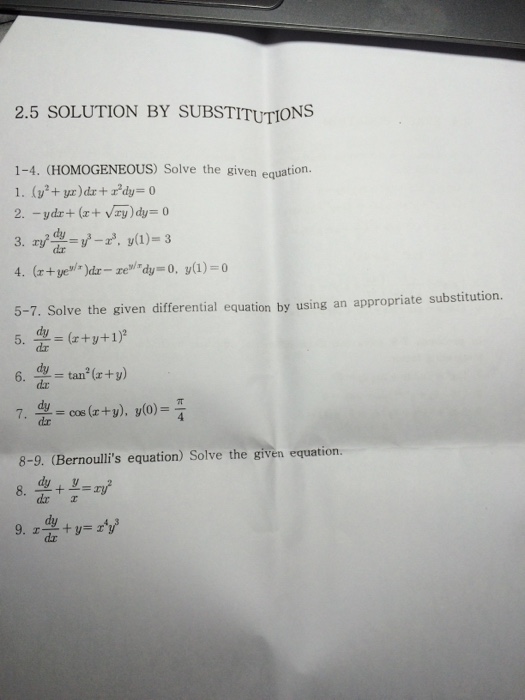


Solved Solve The Given Equation Y 2 Yx Dx X 2 Dy Chegg Com
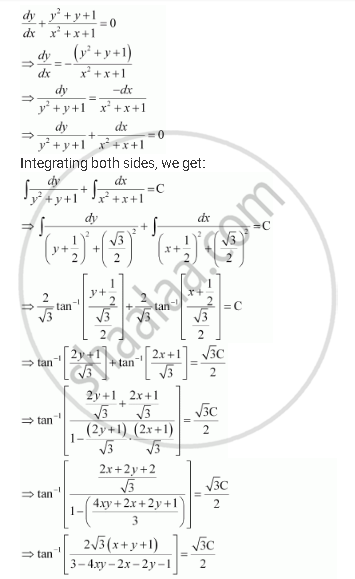


Show That The General Solution Of The Differential Equation Dy Dx Y 2 Y 1 X 2 X 1 0 Is Given By X Y 1 A 1 X Y 2xy Where A Is Parameter Mathematics Shaalaa Com


Solved Solve The Following Differential Equations X Y 3 Dx X Y 1 Dy 0 2 X Y 1 Dx 3x 4y 2 Dy C 3 1 Y 2 Xy 2 Dx X 2y Y 2xy Dy Course Hero



Tutorial 4 Question For Solution By Substitutions Studocu


Find The General Solution Of Differential Equation X 1 Y 2 Dx Y 1 X 2 Dy 0 Sarthaks Econnect Largest Online Education Community



Solution Of Y Xy 1 Dx X 1 Xy X 2y 2 Dy 0 Mathematics Stack Exchange



What Is The Solution For Math Sqrt 1 X 2 Sqrt 1 Y 2 Dx Xy Dy 0 Math Quora



Solve The Following Differential Equations 1 X 3xy Dx Y 3x Y Dy 0 2 Xdy Y Dx Y X2 Y2 Dx 3 X 3xy Dx 3x Y Dy



How To Solve X Y 1 2 Dy Dx 1 Quora


Find The General Solution Of Differential Equation X 2 Y 1 Dx Y 2 X 1 Dy 0 Sarthaks Econnect Largest Online Education Community



Solve The Following Different Al Exercise Begin Array Ll Text I Y 2 D X Left X Y X 2 Right D Y 0 Text Exercise Text Ii X 2 Y D X Left X 3 Y 3 Right D Y 0



Solve Y 2 2x 2y Dx 2x 3 Xy Dy 0 Mathematics Stack Exchange



0 件のコメント:
コメントを投稿